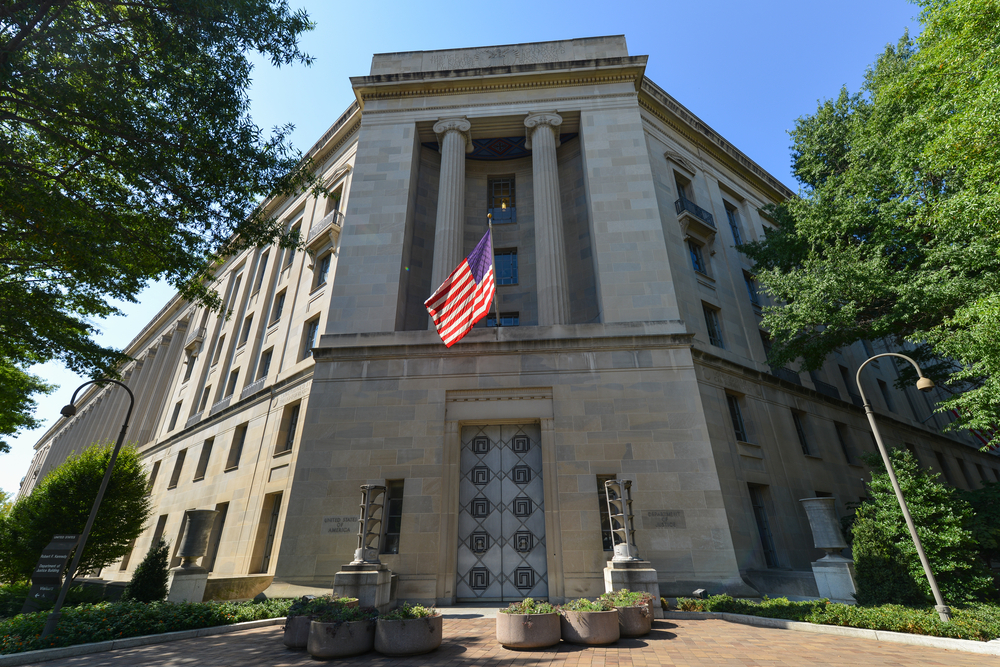How could the DOJ counter Texas abortion restrictions? Law prof suggests prosecution

The Department of Justice building in Washington, D.C. Photo from Shutterstock.
How can U.S. Attorney General Merrick Garland challenge Texas’ new restrictive abortion law when the state isn’t charged with enforcing it and there is no state defendant to sue?
Some abortion-rights supporters say the answer is for the Department of Justice to prosecute private citizens who sue to enforce the law, which bans abortions after a fetal heartbeat is detected, the Washington Post reports.
The law authorizes private citizens to file the suits against abortion providers and others who knowingly help pregnant women violate the law, which effectively bans abortions after about six weeks of pregnancy.
In a letter, Democratic members of the House Judiciary Committee on Tuesday encouraged Garland to fight the law with legal action “up to and including the criminal prosecution of would-be vigilantes attempting to use the private right of action established by that blatantly unconstitutional law.”
The law took effect after the U.S. Supreme Court denied an emergency request to block the law Sept. 1.
Garland said Monday the DOJ was urgently exploring all options to protect women’s constitutional rights but did not say whether criminal prosecutions were under consideration.
In a Washington Post op-ed, Laurence Tribe, a professor emeritus at Harvard Law School, explained how the DOJ could initiate criminal prosecutions using a law intended to battle the Ku Klux Klan.
The department could rely on Section 242 of the federal criminal code, which makes it a crime for those who, “under color of law,” willfully deprive individuals “of any rights, privileges or immunities secured or protected by the Constitution or laws of the United States.” The private citizens who sue under the Texas law are acting “under color of law,” and they are violating the constitutional right to abortion, he said.
Tribe said the DOJ could also rely on Section 241 of the federal criminal code, which makes it an even more serious crime for “two or more persons” to agree to “oppress, threaten or intimidate” anyone “in the free exercise or enjoyment of any right or privilege secured to him by the Constitution or laws of the United States.” Purely private vigilantes acting in concert with others could be prosecuted under this section, he said.
Tribe also suggested a third course of action: The DOJ could seek a court order blocking enforcement of the Texas law under the All Writs Act, which allows federal courts to “issue all writs necessary or appropriate in aid of their respective jurisdictions.”
Tribe was less enthusiastic about Garland’s announcement that the DOJ would protect women from intimidation and physical harm under the Freedom of Access to Clinic Entrances Act. The law is intended to combat those who seek to block access to abortion clinics, and experts told the Washington Post that it would not be of much help in combatting the Texas law.
Tribe told the Washington Post that Garland’s pledge to use civil and criminal enforcement provisions of the FACE Act seemed “quite irrelevant.”
“The threats to the women who seek abortions in Texas are not physical threats to them or the property of the clinics,” he said. “They are threatened with bankruptcy. It’s ironic that the Face Act would be helpful if someone were to knock the door down, but not if they were to bring the whole house down.”
Lawyer Jenny Ecklund, who represents advocacy groups that help women access abortions, told the Washington Post that a future court ruling against the law could come too late. Texas abortion clinics are already complying with the law, and some have stopped providing all abortion services, according to one report.
“My firm belief is that [abortion-rights opponents] don’t care if it’s declared unconstitutional, because their goal is to run everyone out of business beforehand,” Ecklund said.



